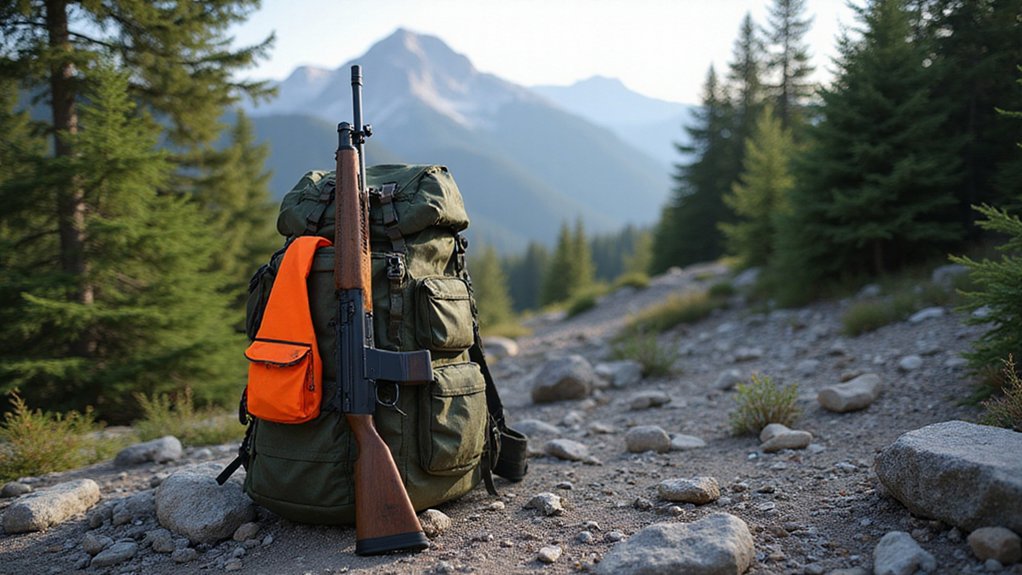Packing for backcountry hunting requires careful consideration and planning. You need to think about your gear, food, and clothing, ensuring you have what you need without overloading your pack. Choosing the right backpack and organizing your essentials can make all the difference. But how do you decide what’s truly necessary? Let’s explore the essentials that will set you up for a successful hunt in the wilderness.
How to Pack for Backcountry Hunting: What Are the Essentials?
When you’re gearing up for backcountry hunting, there are five essential items you can’t afford to forget.
First, a reliable backpack is vital; it should comfortably carry your gear while being durable enough for rugged terrain.
Next, pack a quality sleeping bag to guarantee a restful night after a long day.
Don’t overlook a sturdy tent for shelter against unpredictable weather.
Bring a first-aid kit to handle any minor injuries, and finally, include a multi-tool for various tasks in the field.
With these essentials, you’ll be well-prepared to tackle the challenges of backcountry hunting and enjoy your adventure.
What Gear Do You Need for Backcountry Hunting?
Packing the right gear is just as important as having the essential items. For backcountry hunting, you’ll need a reliable tent, sleeping bag, and sleeping pad for comfort.
Don’t forget a sturdy pair of boots for hiking, weather-appropriate clothing, and a good rain jacket. A reliable hunting knife, binoculars, and a first aid kit are vital for safety and efficiency.
Bring a compact stove and lightweight cookware for meal prep, along with enough food and water. Finally, a map and compass or GPS will keep you oriented in the wilderness.
Choose gear that’s lightweight and durable to enhance your experience.
How to Choose the Right Backpack for Your Trip?
Choosing the right backpack is essential for a successful backcountry hunting trip. Start by considering capacity; a 50-70 liter pack is ideal for multi-day trips.
Look for features like adjustable straps and a padded hip belt for comfort. Waterproof materials can protect your gear from the elements, while external pockets keep essentials easily accessible.
Weight matters too—aim for a lighter pack that still offers durability. Finally, test it out before your trip; fill it with gear and walk around to ascertain it fits well.
The right backpack can make all the difference in your hunting experience.
What Food Should You Bring for Backcountry Hunting?
To fuel your body during backcountry hunting, it’s crucial to select food that’s lightweight, nutritious, and easy to prepare.
Pack high-calorie options like energy bars, nuts, and dried fruits for quick snacks. Dehydrated meals are fantastic for dinner; just add water and heat. Instant oatmeal or granola can kickstart your mornings.
Don’t forget to bring electrolyte powders to stay hydrated, especially when you’re exerting yourself. Consider vacuum-sealed jerky for protein and a satisfying chew.
Finally, carry a small cooking stove or fire-starting kit to make meal prep simple and efficient in the wilderness. Enjoy your hunt!
How to Pack Clothing for Different Weather Conditions?
Selecting the right clothing can make all the difference in your backcountry hunting experience, especially as weather conditions can change rapidly.
Layering is key; start with moisture-wicking base layers to keep sweat away. Add insulating layers for warmth and a waterproof outer layer to shield against rain or wind. Don’t forget a hat and gloves for added protection.
For sunny days, lightweight, breathable fabrics are essential, while colder conditions demand heavier insulation. Always pack an extra set of socks to keep your feet dry.
Stay prepared and adaptable, and you’ll enjoy your hunt, no matter what Mother Nature throws at you.
Why Is Weight Distribution Important in Your Pack?
While you might be tempted to toss everything into your pack haphazardly, proper weight distribution is essential for maintaining balance and comfort on your backcountry hunt.
A well-balanced pack reduces strain on your back and shoulders, allowing you to move more efficiently over rough terrain. Keep heavier items close to your back and centered, which helps stabilize your center of gravity.
Distributing weight evenly across your pack also prevents unnecessary fatigue, letting you focus on the hunt rather than discomfort.
Ultimately, thoughtful weight distribution enhances your overall experience, ensuring you can tackle long days in the wilderness with ease.
How to Organize Your Gear for Easy Access?
Organizing your gear for easy access can make all the difference during a backcountry hunt, especially when every second counts.
Start by categorizing your equipment—group items like cooking gear, first aid, and hunting tools together. Use packing cubes or bags to keep similar items contained.
Place frequently used gear near the top or in external pockets for quick retrieval. Label your bags if necessary to avoid fumbling around.
Finally, practice packing and unpacking your gear at home so you’ll be familiar with where everything is. Being organized not only saves time but also enhances your overall hunting experience.
What Tips Can Help You Pack Efficiently for a Successful Hunt?
How can you guarantee you’ve packed everything you need for a successful backcountry hunt? Start by creating a detailed checklist based on your specific needs and the duration of your trip.
Prioritize essential gear, like your tent, sleeping bag, and food. Use packing cubes or dry bags to keep items organized and dry. Distribute weight evenly in your backpack to maintain balance while hiking.
Don’t forget to pack a first aid kit, tools, and extra layers for unpredictable weather. Finally, do a final gear check before you leave to make certain nothing important is left behind.
Happy hunting!
